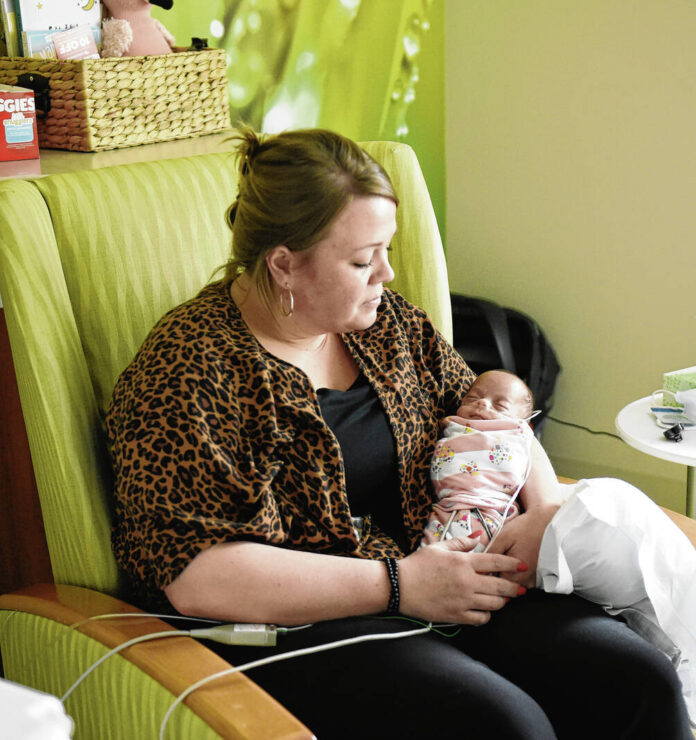
Courtney Kingery holds her newborn daughter Remi in the neonatal intensive care unit at Franciscan Health Indianapolis on April 5. Remi has been in the NICU for about 90 days, but through the new AngelEye system implemented by the hospital, Kingery can check on her daughter 24 hours a day, even when she’s not with her.
RYAN TRARES | DAILY JOURNAL
At the most crucial moments, the image on the screen made the distance between mother and child disappear.
Remi Kingery had been in the neonatal intensive care unit at Franciscan Health Indianapolis for almost 90 days. The tiny baby was getting healthier, as her mother Courtney Kingery could see on her every-other-day visits. But on the days she had to return to her home in Avon, Kingery needed a way to close to her baby girl.
On those days, she could pull out her phone, open up an app and see live video of Remi sleeping.
“It’s really nice. I usually stay here every other night, so it’s super reassuring when I do go home, to log in any time and see Remi,” Kingery said. “I can see what she’s doing and get an update on her care.”
The Kingery family is one of many who have been comforted by a new feature at Franciscan Health Indianapolis. The hospital has implemented live-streaming video and one-way audio system to place on 29 NICU beds.
Parents and family members are able to log on through a secure network to see and hear their baby 24-hours a day.
”(The NICU) isn’t a journey that most parents plan on taking. Some parents can’t stay every night, but it’s hard to leave their baby,” said Lori Kraeszig, unit manager for neonatal intensive care unit and pediatric outpatient clinic at Franciscan Health Indianapolis. “Being able to sit and view their children gives them that peace of mind.”
Like most hospitals, Franciscan Health Indianapolis had a system in place allowing parents to see video of their babies in the NICU. The hospital utilized ceiling-mounted cameras, and parents could call in to get a code to access the video through the GoTo Meeting software.
But the system had drawbacks, said Jennifer Johnson, patient care coordinator at the NICU.
“You can see how far away it was, and it really didn’t zoom in well. All they got was this view,” she said.
In addition, the process was convoluted, requiring parents to get a different code every time they wanted to access the video, Kraeszig said. Only the parents were able to access it.
Officials in the NICU started investigating alternatives. Talking with different companies and software developers, they found one they felt worked best.
“It was a long process. First we had to get the funding, and we were trying to get a grant first, then the hospital approved to fund it,” Kraeszig said.
Developed by the company AngelEye, the system was designed to improve communication and collaboration between families and the nurses and doctors caring for their children.
The camera units are mounted on an adjustable arm that swings down and can be placed right next to the baby’s protective crib.
Families are provided with a secure login, which they can share with multiple people — aunts, uncles, grandparents and others, Kraeszig said.
The camera is on constantly, with the exception of when medical staff are providing care to the baby, Kraeszig said.
“When we’re doing care, we just turn it off for that short time, and turn it back on,” she said.
Video from the cameras is crisp and full of detail. The cameras also have night view, which allows parents to see their children without disturbing the baby’s sleep.
“A lot of times, we fabric draped over so they can sleep, but with the night mode, we can still put it right up to there and they can see the baby,” Johnson said.
Medical staff can also send one-way messages to parents, updating them with little notes on how the baby is doing.
“I always wanted the staff and nurses to be able to reach out to the parents. Everybody is so busy that it’s hard to find that time to sit and call. But now they can send a message, at least once a shift, updating them,” Kraeszig said.
Of the NICU’s 31 beds, 29 of them are equipped with the camera system — the only exceptions being two beds used strictly for short-term observation, Kraeszig said.
Since the system went online on March 16, the response from parents has been overwhelmingly positive.
“Everyone loves it, especially the ones who went from the old system to this. They don’t have to call in the middle of the night to get a code, they can just see their baby whenever,” Johnson said.
Kingery’s baby Remi was born on Jan. 10, and has been in the NICU ever since. The new video system has provided an added layer of relief during their long stay at Franciscan Health Indianapolis.
In addition, she receives more information than ever before about her baby’s progress, Kingery said.
“The nurses send me updates in regard to her care. I like to see how much weight she gained and how much bottle she ate. At every check that I miss, even if I have to leave for meeting, they send me a chat letting me know that,” she said. “It’s that reassurance.”




